I've mentionned before that I have fibroids and let me tell you, of late, they've been getting on my "F'ing" (I don't mind that "F" word) nerves. So what are they???
Fibroids are benign (non-cancerous) tumors that grow in, on or outside of the wall of the uterus. They usually range in size from as small as a pea to as large as a grapefruit. In my case I have 3 large fibroids, each of them around the size of a small orange and numerous small (pea-sized) ones, currently living and growing inside of me. When I was pregnant with my son almost 4 years ago (can't believe he's going to be 3 in just a few months), anyway, some of the fibroids grew to the size of large grapefruits. In fact, I had a very difficult pregnancy and labor and delivery because of the fact that these tumors grew so much that my little boy was competing for space in my womb. After he was delivered, I was informed by the doctor that one of the fibroids was as big as my son's head. It was a very difficult and scary time.
Over the years (6 to be exact), I've seen numerous doctors, OB-GYN's and specialists regarding these tumors and here's some of what I've been told. Some Key Fibroid Facts:
Who can get fibroids?
- I've been told that about 20-25% of all women have fibroids. Most don't even know it or know about it. The majority of the time, these tumors exist producing little to no symptoms what so ever. Supposedly, they are also very common in women over 30. I was 28 when I was first diagnosed. Women over the age of 35 have between a 20 and 40 % chance of having fibroids.
- Supposedly black women are 3 times likelier than other women to have fibroids. I don't know how convinced I am of this fact, simply because whenever I've asked about this statistic and the possible rationale or reasonning behind it, I've never received a straight answer or at least one that makes sense! All I know for certain is that I am a black woman and I do have fibroids...whether or not I'm 3 times as likely to have it than a woman in any other race...I don't know.
- Fibroids are more common in women who are significantly overweight. Significantly overweight?? What does that mean? 30 pounds? 50 pounds? 100 pounds?? Overweight by what standard? I'm not sure. All I know is that I did not maintain a healthy weight so that did not help.
- Also, common in women who have never had children. Again, this was another one of the stats for which a rational possibility or explanation could not be provided but I suspect it's something to do with estrogen levels; and lastly,
- Fibroids are more common in women towards the end of their reproductive years, and they often shrink after menopause.
So that pretty well takes care of the "who can get fibroids" question. My next question was and still is, "What causes these suckers?"
Well, as with a lot of illnesses and diseases, no one knows the exact cause of fibroids, however, their growth seems to be related to estrogen production. If you are pregnant or taking birth control pills or menopausal estrogens, fibroids may grow more quickly because of the increased estrogen level in your body. Hence the rapid growth of my fibroids while I was pregnant.
So how did I find out that I had fibroids? Well, I was at work one day (6 years ago) with a sore tummy and really thought nothing of it as it was that time of the month and as all of us women know, we get a little pain/soreness around that time - no biggie, right? Well, WRONG!!!! A couple hours later, I was keeled over on the floor in what at that time felt like the most excruciating, inexplicable pain I'd ever felt (hadn't gone through my 16-hours of labour yet)!!
Anyway, one of my supervisors drove me to the emergency, where my husband was waiting for me. We waited in the emergency room for upwards of 5 hours before I was seen, only to be told that I may have "eaten" something!! I don't know if it was because I wasn't a thin little thing that the doctor immediately thought that I must have "eaten" something, but I digress.
The next months, actually, couple of years, were followed with numerous doctor and similar hospital emergency room visits only to be sent home with Tylenol-3 prescriptions or nothing at all. Well finally I was referred to a specialist (#2) who ordered a few ultrasounds.
Two of the ultrasounds were like the one's you see on TV, on shows like "A Baby Story" where all you had to worry about was the cold gel on your warm stomach and holding your pee as you maintianed a ridiculously full bladder for as long as possible. Then came the "other" type of ultrasound! OMG!! Never knew it existed and although now I have one, twice a year, I still don't like it. It's a pelvic or "transvaginal" ultrasound - I don't need to provide an explanation and I mean if you really want details, GOOGLE IT!!! All you need to know is that it's uncomfortable.So how do you find out if you have fibroids?
Your doctor might find one or more fibroids during a routine pelvic exam (hence the importance of those annual pap tests) or sometimes during a prenatal ultrasound. If this happens, the doctor may simply note this in your file, and perhaps monitor this during your regular check-ups because as I mentionned earlier, most women who have fibroids are not aware of them. Most fibroids cause minor or no symptoms and don't require treatment. They're just there!!
However, as in my case (Woman?...CHECK, Black Woman?...CHECK, Overweight?...CHECK, Over 30?...CHECK), I am among the estimated 1 in 4 women who have fibroid problems that affect my quality of life and require treatment. Some of the problems or symptoms that fibroids cause are:
- long, heavy menstrual periods with excessive bleeding which, in some cases, cause anaemia; chronic pelvic pain (as in my case);
- general pelvic discomfort (as in my case);
- problems with urination or constipation, caused by large fibroids crowding the bladder or lower intestine (not in my case); and
- pain during intercourse (not in my case - thank goodness ;).
In more severe cases, fibroids have been known to also cause problems with fertility (as in my case); and repeated miscarriage.
Anyway, all this to say that there are times when I am in excruciating pain and it's more frustrating than anything, and this is one of those times. It affects everything from my mood, energy level and ability to workout (at a 100% - give it my all, you know?).
There is good news though, because there are more treatments available than ever and you just need to speak to your doctor/specialist. In the past, doctors often recommended hysterectomies for women with fibroids that caused excessive bleeding. As a matter of fact, one of the doctors I first saw, recommended that I had a hysterectomy. My goodness, I was 30 years old, newly married, with no kids....I couldn't believe that was his recommendation. Anyway, obviously, there were other options like medications and other treatments.
Fibroids are the reason given for an estimated one-third of the 60,000 hysterectomies performed in Canada each year (took this from Statistics Canada website). Now there are options for treating fibroids other than hysterectomy, like;
- hormone therapy which mimics menopause and helps to temporarily shrink the fibroids. Usually recommended for women close to menopause who can take treatment until their natural menopause sets in....side effects are same as menopause side effects
- myomectomy - surgically remove tumors while leaving uterus in tact...side effects, it's major surgery, lengthy recovery time and the fibroids could return
- Uterine fibroid embolization (UFE) - use fibre optics to shrink fibroids by cutting off blood supply, little is known about its long-term effects, especially on future fertility.
I haven't made a decision yet as to how I will "treat" these (other than eating well and exercising) for a few different reasons. On the positive, I had my bi-annual check up last month and it does look like the fibroids are shrinking, nothing major, but they're shrinking...and it may be credited to my new healthy lifestyle and weight loss.
Anyway, I never intended to write so much when I sat infront of my laptop, but here we are. I said all along that my life is not only about this weightloss journey and this just shows that; even though it's all connected. Anyway, I hope this helps somebody or at the very least enlightens, or illicits discussion, even if just a little. I guess this is just another part of my honest rants during this journey of mine. Thanks for reading (especially when the posts are sooooo long!!)
Until next time...
Joania (2KMINE!!)













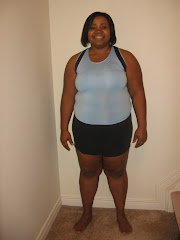

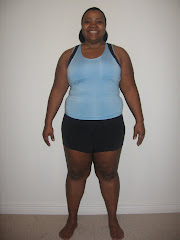
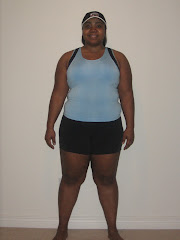
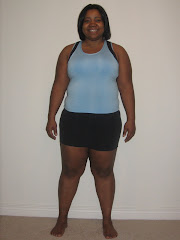

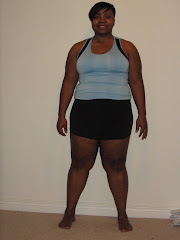




3 comments:
I feel your pain. I don't have fibroids but I do have Polycystic Ovarian disease. The most common symptoms of PCOS are:
* infrequent periods (oligomenorrhea);
* no periods at all (amenorrhea);
* excessive bleeding during your period (polymenorrhea);
* enlarged ovaries with multiple small painless cysts or follicles that form in the ovary;
* skin tags, teardrop-sized pieces of skin that can be as large as raisins and are typically found in the armpits or neck area (also called acrochordons);
* a disorder that causes darkening and thickening of the skin on the neck, groin, underarms or skin folds (also called acanthosis nigricans);
* thinning hair;
* excess hair all over the body, including the face (hirsutism);
* acne;
* weight gain and obesity;
* increased blood sugar; and
* infertility.
I have the entire list! So my dear Joania I feel for you. I did find I felt better when my weight was lower so hopefully you are travelling down that same road.
Keep up the wonderful work even though there are crosses to bear.
Kimberly
Thank you for so much information on this topic. I currently dont have an issue with this (that I know of) but certainly have friends who are either dealing with this or have dealt with it!
great blog. I’m on a diet right now, so this really helps
http://f07928-c3omazme8bd-bkbnh0u.hop.clickbank.net/
Post a Comment